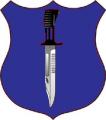Sgt. Thomas X. Hammes knew that, unlike some bad Hollywood movie, the band of thieves, social misfits, even murderers under his leadership would not transform into perfect Marines through some magic formula of tough love and fatherly motivation. Half the men in his platoon needed a swift kick out of the service, not more time in it.
“We kind of got the worst of the guys at the time,” said Hammes. “Probably the worst in the history of the Marine Corps.”
The year was 1976. Young T.X. Hammes was a platoon leader at one of the most inglorious times in the Corps’ proud tradition. The Vietnam War had just decimated the nation’s Armed Forces, the draft was gone, and the fabled Third Battalion, 3rd Marines was being infused with new recruits brought in under dramatically reduced standards.
“All the other units dumped their problems on us,” Hammes said, recalling the junkies and drunkards, the frequent attacks on officers, even riots. “All that came together primarily because we went to low-quality recruiting. You can’t make a silk purse out of a sow’s ear now matter how hard you try.”
For Hammes, now a retired colonel, and others with long memories, today’s military looks a lot like that of 1976. Even more alarming, contrary to predictions that the Army is breaking under the strain of protracted war, most experts say it can continue operating as is—though it will resemble no military we might recognize or be proud of.









 ). Yet it was notable that good units with competent leaders and commanders had fewer problems than did others.
). Yet it was notable that good units with competent leaders and commanders had fewer problems than did others.
Bookmarks